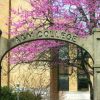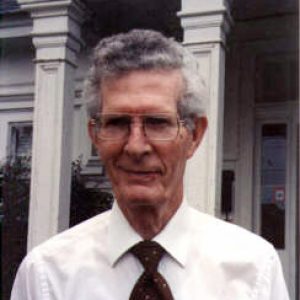calsfoundation@cals.org
James David Bales (1915–1995)
aka: J. D. Bales
From 1944 to 1980, James David Bales was a professor of Bible and theology at Harding University (formerly Harding College) in Searcy (White County). Both in public and in print, Bales earned a national reputation as a fearsome debater of theological issues and political ideologies, becoming especially well known for his anti-communism stance.
J. D. Bales was born on November 5, 1915, in Tacoma, Washington, the fifth of eight children. Soon after his birth, the family moved to Albany, Georgia. Bales was eleven when a train struck and killed his parents. Bales went to live with his paternal grandparents in Fitzgerald, Georgia, until 1930 when he enrolled in the Georgia Military Academy (now Woodward Academy) in College Park, Georgia, where he joined the wrestling team. Then, in 1932, he went to Georgia Tech High School, where he graduated in 1933. Bales next came to Arkansas to attend the small Church of Christ–associated Harding College, where he established a wrestling team and joined the debating team, winning the state championship in 1936. He graduated with a BA in 1937 and received a master’s degree at George Peabody College in Nashville, Tennessee, in 1938. While pursuing his master’s degree, Bales took a course under Professor Michael John Demiashkevich, a White Russian refugee who ignited Bales’s interest in communism. Bales then went west to work on a doctorate in theological studies at the University of California at Berkeley.
In July 1940, while working on his doctorate, Bales married Mary Smart; they had six children. After finishing his PhD in 1944, he returned to Harding to teach Bible classes, quickly developing a reputation for his sharp wit and dry, self-effacing humor. When Harding’s president, George S. Benson, created the National Education Program (NEP) to promote American values such as religious freedom and the free enterprise system, Bales became the NEP’s chief researcher and pamphleteer, writing numerous articles warning the nation about the dangers of communism. The most significant danger, in Bales’s view, was the communist aim of destroying religious faith. Bales felt that communists, whom he viewed as the world’s largest atheistic power, were at their insidious best in their efforts to undermine belief in God. Constantly reading national periodicals, reviews, books, and articles in order to absorb current political and philosophical trends, he was ready to fire off daily letters and articles to newspapers and magazines defending, answering, and challenging any such attacks.
Bales wrote and published more than seventy books and many more articles for religious periodicals, among them: Atheism’s Faith and Fruits (1951), Communism, Its Faith and Fallacies, an Exposition and Criticism(1962), Understanding Communism: A Study Manual (1962), Two Worlds—Christianity and Communism (1965), Americanism Under Fire (1965), and Evolution and the Scientific Method (1976). He also wrote numerous books on theological issues, cults, and controversies within the Churches of Christ. While Bales’s style was at times unabashedly confrontational, bold, aggressive, and often tinged with biting sarcasm when he felt he had the facts on his side, he was also committed to fair play and giving his opponent an honest hearing.
Bales was thrifty and sharp with his money. In 1958, the government of Taiwan invited him to speak, providing him with an open, first-class plane ticket. Bales decided he could use this ticket to go almost anywhere and scheduled some ninety speaking engagements in the Philippines, Korea, Japan, India, and at the World’s Fair in Brussels, Belgium. Unfortunately, during this world tour he contracted an amoebic infection which affected his health for years.
Bales, who could not pass up a bargain, often told how not long after his marriage, he happened into a Toronto, Canada, bookstore just to browse and ended up buying out the store’s entire stock of 6,500 books when the owner offered them to him at five cents a copy. Bales shipped the books to Searcy, where he sold some and kept some. At one time, Bales owned more than 10,000 volumes.
Even though he was often criticized for doing so, Bales participated in some forty public debates with leaders representing atheism, communism, Buddhism, evolution, and numerous Christian denominations and sects. His most famous debate was in Little Rock (Pulaski County) in 1966 against eminent astronomer Carl Sagan with Ernan McMullin, R. C. Lewontin, and Thomas K. Shotwell. Jack Wood Sears, professor of biology and genetics at Harding, was Bales’s debate partner.
Throughout his tenure at Harding, Bales was famous for his wit, humor, and numerous stories about his adventures. He once admitted to giving a list of six items for a listing answer in class and then asking for seven answers on the test. When students were irate over the test, he said he would not count that extra answer but had enjoyed reading the fascinating responses students had offered under pressure to fill the extra space. On another occasion, he gave a 100-question true/false test with every answer being false. “Just wanted to test your resolve,” he told the groaning class after he returned their tests.
After his retirement in the spring of 1981, Bales continued to write, lecture, and preach. He was a member of the White County Civil War Roundtable, to which he often brought antique guns and other relics. At the end of his life, he said he felt as if he “had fought the good fight and had defended the faith.”
Bales died on August 16, 1995, and his ashes rest in the Oak Grove Cemetery in Searcy, next to his wife, Mary.
For additional information:
Bales, James D. Bales-Stonestreet Discussion on the Christian and Carnal Warfare: A Written Debate. Searcy, AR: J. D. Bales, 1947.
———. Christian, Contend For Thy Cause. Searcy, AR: James D. Bales, 1949.
———. Communism and the Reality of Moral Law. Preface by Alexandra Tolstoy. Nutley, NJ: Craig Press, 1969.
———. Forty-two Years on the Firing Line. Shreveport, LA: Lambert Book House, Inc., 1977.
———. The Existence of God: A Debate. Dallas, TX: Eugene S. Smith, 1948.
Brown, Dewey. “Powerful Voice Against the Reds.” Arkansas Democrat Sunday Magazine. September 18, 1960, pp. 2–3.
James D. Bales Collection. Special Collections. University of Arkansas Libraries, Fayetteville, Arkansas.
Paul D. Haynie
Harding University
 Divergent Prosperity and the Arc of Reform, 1968–2022
Divergent Prosperity and the Arc of Reform, 1968–2022 Education, Higher
Education, Higher World War II through the Faubus Era, 1941 through 1967
World War II through the Faubus Era, 1941 through 1967 James David Bales
James David Bales 



Comments
No comments on this entry yet.